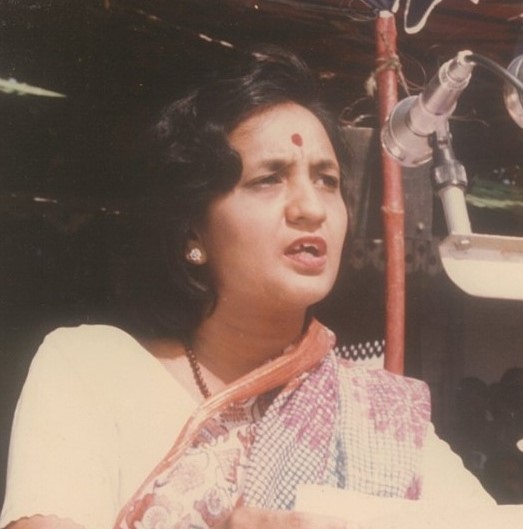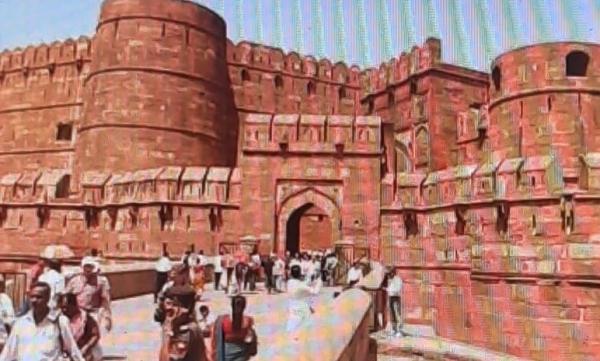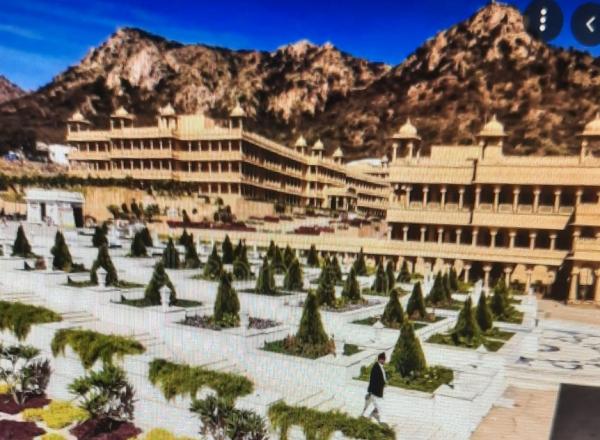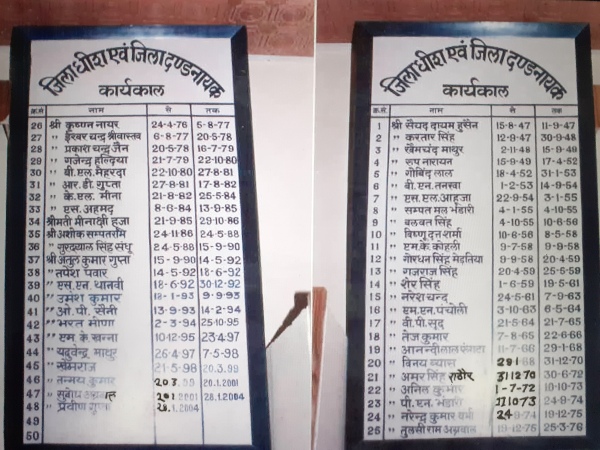Bharatpur Memories

Meenakshi Hooja is an IAS [retd] officer who has served in both Government of India and Government of Rajasthan. Post retirement she was a Member of the Central Administrative Tribunal .
She is a published poet in both English and Hindi. She has authored books on Panchayati Raj and tribal development. She was a visiting fellow at Queen Elizabeth House, University of Oxford (U.K.).

More than 500 Princely States across India had their treaties and alliances with the British Suzerain both during the Company Rule and direct British rule after 1858. Under the concept of British paramountcy the rulers retained their titles and powers as per the treaties and had their own independent internal rule and administrative set up, though there were some limitations. For the modern day Rajasthah, there was the overall Rajputana Agency with its further sub groups. Bharatpur was under the Eastern Rajputana States Agency and acceded to the Indian Dominion at the time of Independence .
Bharatpur had a distinguished past and many glorious periods of history and achievements. The history of the Royal house is often traced to the 11th Century . It was in the reign of Maharaja Surajmal ( 1755 - 63) that it reached its zenith of glory.

History is for grownups. For me as a child, and even later in my growing up days, Bharatpur mattered mainly it was the the District where my father, Khemchand (born 10th April 1911 in Alwar) was posted as Collector and District Magistrate in 1948. This was just a year after Independence, when it was still part of the Matsya Union. We had heard that he played a key role in containing the communal violence that had arisen because of the Partition. Maharaja Brijendra Singh ji, who was the ruler then, became a familiar name in our family, as did the Ghana Bird Sanctuary (later made a National Park and called Keoladeo National Park) and its famous ducks and bird shoots . Also, one of my brothers, Ashok was born in Bharatpur.
A few years later I had completed my stint as Collector Sirohi in 1984 and was posted as Deputy Secretary in the Planning Department at Jaipur. As Sirohi was my first posting as Collector, I had a special passion for the District and my tenure there. In the first place, there were so many VIP visits that took place there, quite clearly due to the attraction of Mt Abu and the growing following of the Brahma Kumaris. President Giani Zail Singh, Vice President Shri Venkataraman and Prime Minister Indira Gandhi all visited during my tenure. The legislative elections for Rajasthan Assembly and later for Parliament also had to be organised. It was an eventful tenure, learning, making some mistakes and improving

It was different world as Deputy Secretary for Planning. Much more into reading and writing notes and reports. Thoughts of Sirohi days would quietly creep in my mind as a matter of both distraction and happiness . Suddenly in this set up of steady calm, came the unexpected news of my posting as Collector Bharatpur in September 1985! After sharing it with my family on both sides, who were somewhat surprised but happy, the very next day I went to call on the Chief Secretary Shri Naresh Chandra Saxena. It was a meeting I always recall with the greatest fondness and nostalgia. Naresh Chandra was not only one of the most capable officers of our cadre and the country (he became Cabinet Secretary, Government of India and later Ambassador to the United States) but was an extremely fine human being. More interestingly , he was often referred to as Bharatpur Naresh amongst friends. He had been very successful as Collector there and had left an indelible imprint. With this background , every word of advice and encouragement that he gave was like a pearl of wisdom. He felt confident that I would do well, and being a lady would be an asset and that he and the State Government had full confidence in me. That really reassured me and allayed the apprehensions that were in my mind .
My father lost no time in giving me advice and counsel as I prepared to pack and join my duties. One advise I still recall was that I should call on the erstwhlie Maharaja at the first possible opportunity as he had been a friend during his time in Bharatpur. He also gave a detailed account of the district and of the people and made special reference to Raj Bahadurji, one of the distinguished leaders and in whose honour the Postal Department also released a stamp later.

It was a new innings and I had to bat carefully at the beginning . After joining duties in the still old Collectorate building and I settled down in the double story, fairly sprawling, Collector’s residence. Actually it was more than fairly sprawling, more like a little manor estate. It had its own grain fields, a badminton court (older workers said it used to have tennis courts too), a mini cricket field at the back, its own cow shed, housed the entire state garage and had the first gobar gas plant in the the district with connected gaslights! It was a beautiful house but a bit scary too, especially at night when hundreds of vultures came back to roost on the trees. Then I thought they were scary. How we miss them now that they are rarely visible. Anyway I occupied only the first floor as the ground floor had some seepage but was also the store house for all the harvested grain and the fodder for the cows.
I am not anoverly religious person but during my time in Bharatpur I decided to go to the famous Banke Bihari Mandir in the evenings quite regularly . It gave me a great sense of calm and relaxation and I felt reenergised with the evening Aarti .
In those days the focus was on poverty elevation (some things never change!). 20 Point Programme, Integrated Rural Development Programme (IRDP) , NREP (National Rural Employment Programme) were some of the important development programmes. The Panchayats were the important agencies of development . As in Sirohi, I started taking coordination meetings and visiting Panchayat Samitis and Panchayats on a fairly regular basis . The Zila Pramukh Shri Hari Singhji was an extremely warm , affectionate , capable and a reasonable person and it was a sheer delight to work with his guidance. What I thought was a normal administrative activity , got greatly appreciated and gave me immense confidence and reassurance in myself . Our district came first in the 20 point programme for the year 85-86 . In those days at the 15th August Independence Day function, the tradition of Collectors giving their own speech was still the norm and what a thunderous applause was there when I announced to the gathering that we had come first ! It may sound conceited , but coming first was a matter of real thrill.
They say that a Collector must know the District like the back of their hand and know what's cooking in every kitchen . Well it is easier said than done . However to come somewhere near this norm, I used to draw up monthly programmes of tours, inspections, night halts, but kept some element of surprise and sudden checking . This worked well It was during my many tours and inspections that I could meet so many people and see places, which I would have otherwise missed . The women in particular came out to meet me as I was the first lady collector of the district . Once a group of them asked me if I would be able to tour and work as hard as my male predecessors. I replied that I would surely try, but I will definitely be able to talk to women and listen to their views more easily. This brought huge smiles and glee on their faces, and I felt as if I had answered a UPSC interview question to the full satisfaction of the Board!
For many in the present times , it would be difficult to believe that you could not do anything religious during an official function . There was a big Mela of the fertiliser companies for the benefit of the farming community. Some of the organisers wanted to have a Bhoomi Poojan before starting the preparations. I could not agree to it but as they were very keen and it was a matter of deep faith for them, I suggested a via media . Perhaps they could do a small Bhoomi Poojan before the crack of dawn and satisfy their beliefs. They immediately agreed and the matter rested there. Not only that , the function went off very well with a large number of farmers attending it .
Law and order is the responsibility of the District Magistrate (DM). Apart from the Superintendent of Police (SP), the DM has to have good equations with other Police officers and the Thanas. During my tours , I would often stop at the Thana enroute, and chat up with the Police staff, enjoy a cup of relaxing coffee while writing the Inspection Report or studying the file on history sheeters . It was indeed a good working system, because the responses in times of any problem, VIP visits were generally positive and helpful. And a strangly this comradrie solved a problem many years later. As Secretary Art and Culture in charge of the Jhanki from Rajasthan I was going to attend the Republic Day Parade in New Delhi . Quite some distance had to be walked through a big crowd before we could reach our seats . As I was trying to negotiate my way with difficulty , I found one policeman on duty saying, inko jaane do, yeh Bharatpur Collector raheehain ( let her go she has been Bharatpur Collector ) and the police suddenly cleared a path for me. Nothing could have been better music to my ears than to be recognized in this way, even a decade after having been Collector in Bharatpur and that too in the Capital city of the country.
Though not as many as in Sirohi, but there was one very major VVIP visit in Bharatpur too and that was of then Prime Minister Rajiv Gandhi. Shri Natwar Singh, who was MP from Bharatpur and Minister in the Council of Ministers in GOI was extremely keen that the visit should go off very well. After a lot of discussions it was decided that the PM would visit the village Saumka in Tehsil Pahari . In one of the preparatory trips I fell off the jeep as the road was slippery, because of wettish mud. But recovery from a mild injury was quick , perhaps because of the challenges ahead . However the visit and all the arrangements went off reasonably well, mainly because of the team work shown by the officers of various Departments who by now had got used to my style of working and coordination and personal equations helped immensely . It was a great relief in the end followed by a long nap in the afternoon .
The Fort of Bharatpur is indeed unique and is called Lohagarh . Built during the time of Maharaja Surajmal, it could withstand the successive attacks by the British led by General Lake in 1805. It is surrounded by a water moat and has many impressive buildings and palaces that stand like a sentinel and guard even today. I always enjoyed a visit to the Fort and the well set up Museum there. Today it also has a magnificent Smarak dedicated to Raja Surajmal bringing out his major contributions and the history of Bharatpur.
After having somewhat absorbed the environment and learnt more about the people and places of Bharatpur, it's special flood irrigation systems , the Rabi cropping patterns , the rivers and hills , I felt confident enough to call on the Maharaja of Bharatpur, Brijendra Singh ji, as advised by my father. I was very happy that he gave me a warm reception and recalled my father well.
The then Chief Secretary, Shri VBL Mathur, who had succeeded Shri Naresh Chandra, had once come on a visit to Bharatpur. I travelled back to Jaipur with him, and in normal circumstances, the talk and discussions would have revolved round the issue pertaining to the District or administration in general. However, there was a Cricket match going on, probably, if I recall correctly, between India and West Indies. Everyone in my parental family, led by my father, was either good at playing cricket, or a cricket fan with scores being written down once the game started . So even though being a girl, I liked and knew much about cricket and always listened to the test commentary on AIR and BBC .
No doubt the CS knew much more about cricket than me . As there was a radio fitted in the car, a privilege indeed, we decided to listen to the running commentary. Though the sound was not clear, yet we could make out the words quite clearly enough to get a sense of the play going on. And then came the excitement . It was a real close bat and ball game and kept us on tenterhooks as we drove along, ending on a nail biting finish with a tie at the end, and what a roar from the field that never seemed to end ! A real unforgettable experience it was.
It was always a treat to go to the Bird sanctuary, early in the morning especially as I had the privilege to go around with the Forest Officer in charge, who explained things and pointed out the names of the birds as we rode along in the jeep . What I liked most was the flora and the overall serene ambience and observing the birds and the ducks in all their fine feathers and colours . Sometimes later I even wrote a poem on Birds of Bharatpur .However more than me, the boys Rajat and Rakshat, then aged around eight and six respectively, whenever visiting Bharatpur would never miss a chance to go to the sanctuary. Getting up early and even being ready by around 5 am. That generated enduring interest and passion in birds and Rajat has even become a good photographer of birds, bringing out a calendar of birds every year .
In a district assignment, ultimately what matters, is how you relate to the people and respond to their needs, and implement the Acts and rules and directives in a fair and prompt manner . For this a systems approach always helps . At that time the Lakhina pattern, established in the district of Ahmednagar in Maharashtra by then Collector AK Lakhina was a role model. Guidelines of standard formatting and other reforms were also suggested by Shri DR Mehta, then Secretary to Chief Minister. I tried my best to incorporate them into our working, especially after we moved into the newly built, spacious Collectorate building, where changes were easier to make. I suddenly found that I had more time on my hands , was able to pay more attention to special matters, avoid errors of omission and commission, as well as enjoy the serene and green ambience of my residence .
As things would have it, I had to undertake a disaster management exercise when an unexpected hail storm destroyed properties across Bharatpur but caused great damage in Nadbai, a Panchayat Samiti Headquarter town, and in nearby villages. Seeking help from all Departments, we were able to restore water and electricity supply within a within a day, provide medical help where needed, and thereafter took stock of the damage to the houses and the crops .
The VIPs fortunately visited only after the fifth day, when things were better and after having met the people, we could have a simple packed lunch together . And I had no experience of any Disaster Management earlier , but the systems evolved and implemented come to my aid .
There were tough times too. One of the most difficult ones was a situation I had never imagined; that as a form of protest, the body of a dead person was attempted to be brought to the residence. When I was informed of this likely possibility, I immediately went to the Collectorate and called the persons into my chamber, of course with one or two other officers present there for support. The matter ended quietly and fortunately there was no repeat , but it made me realise the need to be sensitive to the problems of the people .
It is quite rare to be Collector of a District where your father has been one earlier and to see his name on the Board behind you . Apart from being a matter of joy , it was also a challenge, that I should not do less but better and keep up the standards he laid down. He had gained a special reputation in handling the partition and refugee problems , which were extremely challenging at that time . He even got a letter of appreciation from then Administrator of the United State of Matsya Shri KB Lall , which is a treasured document of our family .
As my husband Rakesh was selected for a one year course in the University of East Anglia in Norwich UK , under the British Council Scholarship Scheme, I requested the Govt to transfer me back to Jaipur and it was agreed and orders issued . I packed and even had some farewells. Suddenly the transfer was stayed, and I was asked to stay on. I was not sure of the reason and this made me feel extremely awkward and I was quite at a loss as to how to carry on . It was a real surprise and a pleasure when Shri Lala Ram Ken MP from Bayana met me personally and requested me to continue as people liked my work . I thanked him for the confidence he had in me and explained about the family position. He realised my predicament and did not press any further.
I left Bharatpur, feeling sad as well as happy. This was because of the love and affection given by the people, who were simple at heart, frank and bold, and spoke in the melodious Brij Bhasha . The women mainly wore sarees with ulta palla, something that was distinct from the Lehnga Odhni worn in other parts of Rajasthan .
The Officers and staff were mostly cooperative. I enjoyed considerable support from the public representatives and guidance from the Chief Minister , Chief Secretary and other senior officers . The press too did give due publicity to our activities. This naturally gave me the ability to deal with the routine, sometimes grinding, and to take tough decisions and face challenges in difficult circumstances. I had the satisfaction of now going back to Jaipur in view of family responsibilities, and assume charge of Special Secretary Irrigation . A we drove down, Chhonkarwara, the first big village , when you enter Bharatpur from Jaipur by road, also seemed to be saying it's Goodbye as I passed by.
Epilogue:
Once I returned to Bharatpur on duty assigned in view of heavy floods in the mid 90’s. In a village all by myself, I was trying to study the extent of the damage, and asking questions from an old person standing at the entrance door of his hut, when he suddenly said ; tain to purani Collector haingi ( you are an earlier Collector )!
I could not have asked for better recognition.
Add new comment